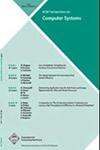Scaling Membership of Byzantine Consensus
IF 1.8
4区 计算机科学
Q2 COMPUTER SCIENCE, THEORY & METHODS
引用次数: 0
Abstract
Scaling Byzantine Fault Tolerant (BFT) systems in terms of membership is important for secure applications with large participation such as blockchains. While traditional protocols have low latency, they cannot handle many processors. Conversely, blockchains often have hundreds to thousands of processors to increase robustness, but they typically have high latency or energy costs. We describe various sources of unscalability in BFT consensus protocols. To improve performance, many BFT protocols optimize the “normal case,” where there are no failures. This can be done in a modular fashion by wrapping existing BFT protocols with a building block that we call alliance. In normal case executions, alliance can scalably determine if the initial conditions of a BFT consensus protocol predetermine the outcome, obviating running the consensus protocol. We give examples of existing protocols that solve alliance. We show that a solution based on hypercubes and MACs has desirable scalability and performance in normal case executions, with only a modest overhead otherwise. We provide important optimizations. Finally, we evaluate our solution using the ns3 simulator and show that it scales up to thousands of processors and compare with prior work in various network topologies.拜占庭共识的扩容成员
在成员方面扩展拜占庭容错(BFT)系统对于区块链等具有大量参与的安全应用程序非常重要。虽然传统协议具有低延迟,但它们不能处理许多处理器。相反,区块链通常有数百到数千个处理器来增加鲁棒性,但它们通常具有高延迟或能源成本。我们描述了BFT共识协议中不可扩展性的各种来源。为了提高性能,许多BFT协议对没有故障的“正常情况”进行了优化。这可以以模块化的方式完成,方法是用我们称之为联盟的构建块包装现有的BFT协议。在正常情况下,联盟可以可扩展地确定BFT共识协议的初始条件是否预先决定了结果,从而避免运行共识协议。我们给出了解决联盟的现有协议的例子。我们展示了基于超多维数据集和mac的解决方案在正常情况下具有理想的可伸缩性和性能,在其他情况下只有适度的开销。我们提供重要的优化。最后,我们使用ns3模拟器评估了我们的解决方案,并展示了它可以扩展到数千个处理器,并与各种网络拓扑下的先前工作进行了比较。
本文章由计算机程序翻译,如有差异,请以英文原文为准。
求助全文
约1分钟内获得全文
求助全文
来源期刊

ACM Transactions on Computer Systems
工程技术-计算机:理论方法
CiteScore
4.00
自引率
0.00%
发文量
7
审稿时长
1 months
期刊介绍:
ACM Transactions on Computer Systems (TOCS) presents research and development results on the design, implementation, analysis, evaluation, and use of computer systems and systems software. The term "computer systems" is interpreted broadly and includes operating systems, systems architecture and hardware, distributed systems, optimizing compilers, and the interaction between systems and computer networks. Articles appearing in TOCS will tend either to present new techniques and concepts, or to report on experiences and experiments with actual systems. Insights useful to system designers, builders, and users will be emphasized.
TOCS publishes research and technical papers, both short and long. It includes technical correspondence to permit commentary on technical topics and on previously published papers.
 求助内容:
求助内容: 应助结果提醒方式:
应助结果提醒方式:


